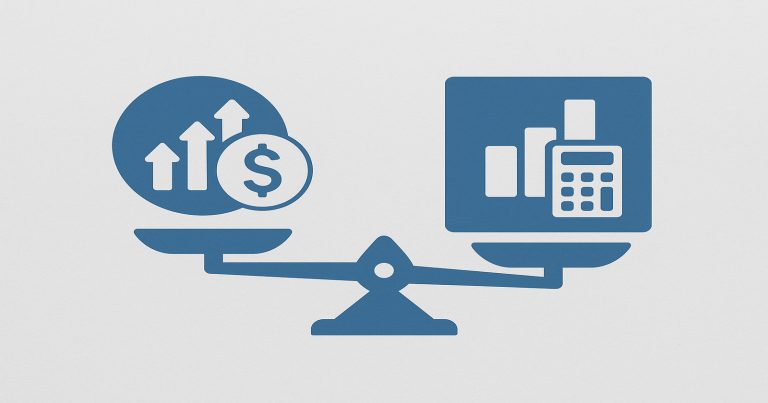Finance vs accounting is a topic that many students find confusing. Both fields deal with money and numbers, but they are very different in what they focus on. Finance looks ahead, while accounting looks back. Finance helps plan for the future, while accounting records what has happened. This article explains the topic in simple words. It allows students to determine which path suits their talents, interests, and objectives. This guide would clear the confusion if someone feels indecisive about two choices.
Meaning and Focus of Finance vs Accounting
Students often mix up finance and accounting. These two fields may look similar, but their goals and methods differ. Knowing their true meaning is the first step in choosing the right path.
Understanding Finance and Accounting
Finance deals with how people, companies, or governments manage their money. It plans for the future. People in finance help businesses decide about saving, investing, and growing money. Finance involves risk, forecasting, and decision-making.
Accounting, on the other hand, records, tracks, and reports past financial actions. It keeps records clean and correct. Accountants work with numbers to make sure money is managed correctly. Accounting helps businesses stay legal and follow rules.
Here is a simple table to explain the difference:
| Factor | Finance | Accounting |
| Focus | Future planning | Record of past transactions |
| Skills needed | Analysis, strategy, problem-solving | Accuracy, attention to detail |
| Work type | Decision-making, risk management | Bookkeeping, auditing, and reporting |
| End goal | Grow wealth | Track and report financial activity |
| Time frame | Forward-looking | Backward-looking |
Both fields use math and financial knowledge. But their purpose, skills, and roles vary a lot. Knowing this helps students make better career choices.
Career Paths in Finance vs Accounting
Choosing between an accounting and a finance career path depends on the work a student enjoys. Both fields offer strong job growth and many roles, but the types of work differ.
Career Options in Finance
Finance has many job types. A student who enjoys planning, investing, or growing businesses may do well in finance. These are typical career paths in finance:
- Investment Banker: Helps companies raise money from investors.
- Financial Analyst: Studies markets and company data to give advice.
- Portfolio Manager: Manages groups of investments.
- Risk Manager: Studies what risks may affect a business and finds ways to mitigate them.
- Corporate Finance Manager: Works inside a company to plan budgets and growth.
People in finance often work in banks, investment firms, or big companies. These jobs need sharp minds that enjoy looking ahead and solving problems.
Career Options in Accounting
Accounting also has many job roles. A student who enjoys accuracy and following rules may do well in accounting. These are typical accounting jobs:
- Auditor: Checks if the company records are correct and fair.
- Tax Accountant: Helps people or companies file correct taxes.
- Forensic Accountant: Looks for fraud or crime in money records.
- Management Accountant: Tracks costs and budgets for a business.
- Public Accountant: Offers services like auditing or tax help to clients.
Accountants work in accounting firms, companies, or the government. These roles need people who like working with details and clear rules. Both paths have good career growth. But the work feels very different. Choosing the right one depends on interest and working style.
Skills and Education: Finance vs Accounting Personality Match
Choosing the right career is easier when students match their skills and interests to the field. The topic of finance vs accounting personality helps students pick the better fit.
Personality Fit for Finance
Finance may interest you if you enjoy debate, complex problem-solving, or deciding on the spur of the moment. The usual finance jobs, where the action is fast, teamwork is needed, and market study is done, suit people who like thrilling and competitive work. A promising finance career needs:
- Comfort with risk and change
- Strong decision-making skills
- Interest in markets and business trends
- Quick thinking
- Good people skills
Personality Fit for Accounting
Students who enjoy solving math puzzles or organising things may do well in accounting. The work is more stable and structured. It suits those who like calm work and step-by-step tasks. A promising accounting career needs:
- Love for accuracy and details
- Enjoyment of routine and order
- Trust in rules and ethics
- Patience and focus
- Strong math skills
Education Path Differences
Students must pick courses based on the jobs they want. Finance needs strong economic and market understanding. Accounting needs knowledge of laws and reporting standards. Both fields offer good pay and growth with the proper education.
| Field | Main Subjects in Study | Common Degrees |
| Finance | Investment, Economics, Statistics | BBA Finance, MBA, CFA |
| Accounting | Tax, Auditing, Financial Reporting, Law | BCom, CA, CPA, ACCA |
Work Environment and Salary: Accounting vs Finance Career Path
The day-to-day work in finance and accounting is different. The kind of pressure, workplace culture, and salary structure vary greatly.
Workplace in Finance
Finance roles often involve long hours, especially in investment banking or trading. These jobs move fast and demand quick choices. People work in big teams. They usually face strict deadlines.
Finance jobs happen in:
- Banks
- Stock markets
- Investment firms
- Big companies
- Startups
Some roles need meeting clients or making presentations. The work keeps changing and needs fast learning.
Workplace in Accounting
Accounting roles are more stable. Accountants work during regular office hours, except during tax season. Their work needs focus and accuracy. They often work alone or in small teams.
Accounting jobs happen in:
- Accounting firms (like Big 4)
- Private companies
- Government offices
- Non-profit organisations
The work follows laws and rules. Accountants update reports, file returns, and do audits.
Salary Comparison
Finance jobs can pay more but come with higher stress and longer hours. Accounting jobs give stable income and regular hours. Both can lead to leadership roles over time.
| Role | Starting Salary (INR/year) | Mid-Level (INR/year) | Senior Level (INR/year) |
| Financial Analyst | 4–6 LPA | 8–12 LPA | 18+ LPA |
| Investment Banker | 8–12 LPA | 15–25 LPA | 35+ LPA |
| Chartered Accountant | 7–10 LPA | 12–18 LPA | 25+ LPA |
| Tax Consultant | 5–7 LPA | 10–15 LPA | 20+ LPA |
Finance vs Accounting FAQs
1. Which is harder to study: finance or accounting?
Accounting needs attention to rules, details, and laws. Finance needs to think ahead and solve big problems. Both require hard work, but accounting feels more technical while finance is more strategy-based.
2. Is finance a better career than accounting?
Finance can offer more money and faster growth. However, accounting gives job safety and steady hours. The better career depends on what a student enjoys and their skills.
3. Who earns more: finance or accounting?
Finance professionals earn more, especially in investment banking or fund management roles. However, top accountants also earn well, especially after gaining years of experience.
4. What is the difference between finance and accounting personality?
Finance suits people who like change, taking risks, and quick action. Accounting suits those who enjoy routine, rules, and steady work.
5. How do you choose between accounting and finance career paths?
Students should look at what they enjoy in school. They may like finance if they like markets, trends, and planning. Accounting may be better if they like math, detail, and rules.


